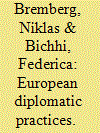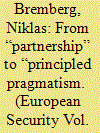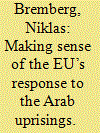| Srl | Item |
| 1 |
ID:
148312


|
|
|
|
|
| Summary/Abstract |
As the aim of this special issue is to show practice approaches at work in the case of European diplomacy, this introduction provides readers with a hands-on sense of where the conversation about practices and European diplomacy currently stands. By introducing the key terms and overviewing the literature, the article contextualises the guiding questions of the special issue. It starts by reviewing how practice approaches have evolved in IR debates. It then describes European diplomacy’s nuts and bolts in a post-Lisbon setting. It continues by focusing on specific practices and analytical mechanisms that contribute to understand European diplomacy’s transformations and the role of security. While the debate about practices goes beyond the case of diplomacy, the latter has become a showcase for the former and this special issue continues the debate on practices and diplomacy by zooming in on the European Union.
|
|
|
|
|
|
|
|
|
|
|
|
|
|
|
|
| 2 |
ID:
174571


|
|
|
|
|
| Summary/Abstract |
The EU’s relations with countries in the Southern Mediterranean have a long history as the region is of great strategic importance for the Union and its member states. The High Representatives of the Union for Foreign Affairs and Security Policy have been highly involved in shaping these relations, and this role has been officially strengthened with institutional changes brought about with the Lisbon Treaty. This article analyses the role of the HR/VPs in shaping the EU's foreign and security policy towards the region with an analytical focus on discursive practice. Drawing on insights from practice theory in IR and EU studies, the analysis traces continuity and change in how the Southern Mediterranean is described in the drafting of key strategic documents. The main finding is that EU foreign and security policy towards the Southern Mediterranean shows a high degree of continuity despite several crises and institutional changes, although the discursive practices have evolved. The article ends by highlighting a conundrum that the EU can be said to implicitly acknowledge: if authoritarian states in the Southern Mediterranean are inherently unstable, yet stable enough to quench the democratic aspirations of their people, then what should be the basis for EU actions?
|
|
|
|
|
|
|
|
|
|
|
|
|
|
|
|
| 3 |
ID:
148314


|
|
|
|
|
| Summary/Abstract |
The Arab uprisings of 2011 put into question previously held understandings about the stability of authoritarian regimes in North Africa as well as the European Union’s (EU’s) relations with countries in its southern neighbourhood. Despite early calls on behalf of the EU to change its policies, the Union’s responses in the early stages seemed mostly characterised by continuity. This article claims that certain dispositions and background knowledge developed over several decades vis-à-vis EU’s Mediterranean policies served as a baseline from which EU officials and diplomats acted. Drawing on insights from practice approaches, the article argues that the practical understandings on what the EU can (and cannot) do vis-à-vis partner countries in North Africa create a kind of power politics of practical dispositions. The article focuses on the European Neighbourhood Policy - the EU’s flagship initiative - and builds on a unique set of data that combine policy documents and interviews with about 30 EU officials and national diplomats from before and after the Arab uprisings. In this way, it illustrates how practice relates to change in that even though the EU’s responses drew on an established repertoire of practice, enacting it in a new context opened up new possibilities for action.
|
|
|
|
|
|
|
|
|
|
|
|
|
|
|
|
| 4 |
ID:
091885


|
|
|
|
|
| Publication |
2009.
|
| Summary/Abstract |
The development of European Union (EU) civil protection cooperation highlights important issues in the debate on the internal-external security nexus. It points to the increased transnationalization of threats usually assigned to the field of 'internal' security, but it also presents researchers with a puzzle: despite the relatively rapid development of civil protection cooperation, there is still substantial disagreement among the EU member states as to how it should continue to develop. Applying an analytical framework based on neo-institutional organization theory and the study of organizational 'fields', this article explores two questions: What is the institutional basis for member states' diverging positions on the future direction of EU civil protection? and How may these positions affect the current development of EU civil protection? Our analysis draws upon empirical evidence from civil protection practice in Spain, Sweden and the EU, including official documents in the form of bills and laws, policy papers and elite interviews. We find that the basis for member states' diverging positions on the future of EU civil protection is rooted in conflicting national institutional logics of civil protection. No logic has become dominant at the EU level, suggesting that as long as multiple institutional logics continue to coexist, disagreement on the future development of European level civil protection cooperation will persist.
|
|
|
|
|
|
|
|
|
|
|
|
|
|
|
|